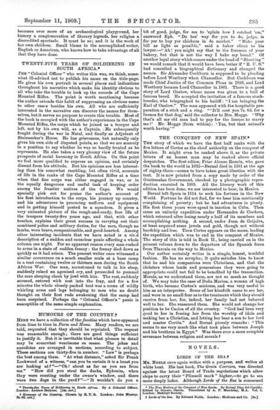THE CONQUEST OF NEW SPAIN.*
THE story of which we have the first half ranks with the fire letters of Cortes as the chief authority on the conquest of Mexico. It might even be ranked above it, as the private letters of an honest man may be ranked above official despatches. The first editor, Friar Alonzo R,emen, who gave the book to the world in 1632—Bernal died in 1581 at the age of eighty-three—seems to have taken great liberties with the text. It is now printed from a copy made by order of the Guatemalan Government, checked by a photographic repro- duction executed in 1895. All the literary work of this edition has been done, we are interested to hear, in Mexico.
Bernal left Spain in 1514 to seek his fortune in the New World. Fortune he did not find, for we bear him continually complaining of poverty; but he had adventures in plenty. His first three years were spent in inaction in Cuba. Then came an unlucky expedition under Hernandez de Cordova, which returned after losing nearly a half of its members and accomplishing nothing. A second, under Juan de Grijalva, at least acquired some jewels and gold, though not without hardship and loss. Then Cortes appears on the scene, leading the expedition which was to end in the conquest of Mexico. The story of this is told in Book II., being carried on in the present volume down to the departure of the Spanish force from Tlaxcala on the way to Mexico.
Our author certainly writes in a simple, honest, truthful fashion. He has no scruples ; it quite satisfies him to know that he and his companions were Christians, and that the idolaters whose lands and possessions they were going to appropriate could not fail to be benefited by the transaction. Morals, as we understand them, are not so much as thought of. We may take the case of Doila Marina, a woman of high birth, who became Cortes's mistress, and was very useful to him as an interpreter. Some of her kinsfolk came to see her, and were in no small fear as to the treatment which they should receive from her, for, indeed, her family had not behaved well to her. She reassured them. She would not change her position to be Cacica of all the country. " God had been very good to her in freeing her from the worship of idols and making her a Christian, and letting her bear a son to her lord and master Cortes." And Bernal piously remarks : " This seems to me very much like what took place between Joseph and his brethren in Egypt." Was there ever a more complete severance between religion and morals ?






































 Previous page
Previous page